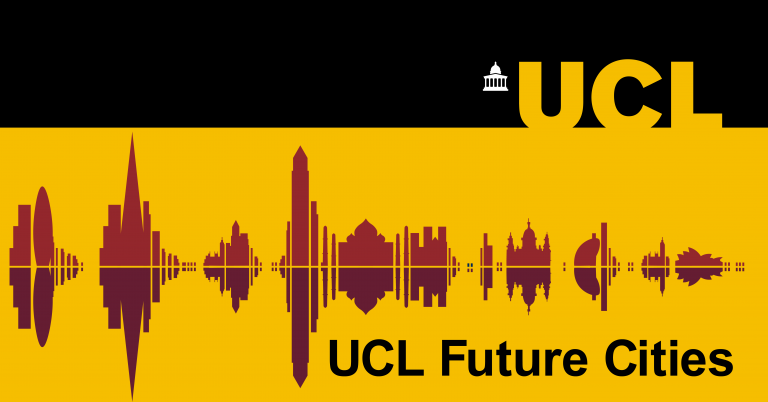New UCL podcast asks what the future of our cities might be
7 June 2021
The UCL Future Cities podcast examines today’s most crucial topics and how technology, climate change, health and society all interconnect with the urban spaces of tomorrow.

As we are moving to east London, with UCL East offering an innovative university campus that is both in the heart of a vibrant urban area and in the middle of a park, UCL’s new podcast series provides a unique opportunity to enter the debate on the future of cities.
UCL Future Cities, which launched in early May, offers a series of cutting-edge conversations from experts from across the university, who ask what the future of our cities might be and discuss how new research and applied innovation can help.
The podcast’s first series has focused on London, examining urban issues in the capital such as the city’s post-pandemic and post-Brexit future, gentrification, smart cities, and memory mapping urban histories.
UCL East is a partner in the production of the podcast; episodes 2 and 3, in particular, have focused on themes that will be further explored in the exciting interdisciplinary academic programmes and research areas coming to the new Stratford campus.
Episode 2: How gentrification has created a city of paradoxes
In ‘Episode 2: How gentrification has created a city of paradoxes’, Professor Christoph Lindner, Dean of The Bartlett, UCL’s Faculty of the Built Environment, Hannah Sender, Research Fellow at the UCL Institute of Global Prosperity and Thul Khan, Housing Solicitor at the UCL Integrated Legal Advice Clinic, discuss the issue of gentrification in London, which is when local communities are unintentionally displaced by more affluent or socio-economically privileged groups through processes of urban regeneration.
During their discussion, Thul Khan notes the benefits of the post-Olympic regeneration of Stratford and the Olympic Park area, such as the inclusion of affordable housing quotas, although he draws attention to the challenges of balancing the renewal of the area through the construction of the park and new flats with keeping housing prices in the area affordable.
Likewise, Hannah Sender argues that “there are a lot of amazing initiatives that are happening in East London, that probably wouldn't have happened without the Olympics” and the subsequent regeneration, while recognising that housing is the ultimate factor in whether these projects benefit the local community.
Thul also stresses the importance of wider policy contexts in these issues, and that the best way to ensure London has affordable accommodation is “quite simply just building more social housing”. For Thul, “the beauty of the city is that we have everyone living side by side”, and Hannah agrees that “it’s time that we recognise the value that that diversity can bring to a place”, as having people from different ethnicities and educational backgrounds in an area is something which people really appreciate.
Such a focus on making regeneration projects work for all, and embedding new developments within existing communities, echoes the ethos of UCL East, as shown by the ambitious programme of local engagement.
Episode 3: Is London truly a smart city?
In ‘Episode 3: Is London truly a Smart City?’, Dr Sarah Wise and Prof Duncan Wilson from the Centre for Advanced Spatial Analysis at The Bartlett, UCL's Faculty of the Built Environment, are joined by Kulveer Ranger, UCL alumnus and an expert in digital transformation, and Senior Vice President of Strategy Communications for Atos UK&I.
Prof Wilson talks about the fantastic opportunities that data provides for understanding the built environment, and gives the example of the monitoring of bat noises by sensors around the Olympic Park. This, he argues, is a great example of a local community being able to understand the impact of building on local biodiversity, as an abundance of bats is a good indicator that other species in the food chain are also thriving.
In addition, Prof Wilson describes the idea of a ‘living lab’ on campus, afforded by sensors and connectivity, and using ‘Internet of Things architecture’ to treat data as a material to be worked with in evolving real-life contexts. Kulveer asserts that any ‘smart’ development or city needs to be beneficial and accessible to everyone, including democratic decision-making based on data. These principles, Prof Wilson highlights, are reflected in the exciting new Master’s programme in Connected Environments which will be offered at the UCL East campus from 2022, and align with the values of the entire UCL East project.
You can listen to the UCL Future Cities podcast now, and stay tuned for forthcoming episodes!
 Close
Close

